News Release from windfair.net
Wind Industry Profile of
Crisis-proofed and without alternatives
The Renewable Capacity Statistics 2023 report published earlier this week by the International Renewable Energy Agency (IRENA) once again shows that renewable energies continue to grow at record levels despite uncertain times. On the other hand, electricity generation from fossil fuels is clearly going downhill.
According to the report, last year, globally available renewable generation capacity increased to 3,372 gigawatts, representing an addition of 295 GW. “This continued record growth shows the resilience of renewable energy amidst the lingering energy crisis,” IRENA’s Director-General Francesco La Camera said.
He sees the reason for this in the convincing economic arguments for renewable energies and the currently particularly favourable political framework conditions. The U.S. with its Inflation Reduction Act (IRA) and the Chinese with their subsidy programmes have ensured that green technologies end up at the top of investors' lists. Europe will soon follow suit, having just presented a first draft of its Net Zero Industry Act. Numerous individual measures have already been initiated last year, such as a simplified licensing policy specifically designed to remove previously existing obstacles to the energy transition.
And all this primarily to counteract the energy crisis that was triggered by Russia's war against Ukraine and has caused a rapid rise in energy prices worldwide.
The aspect of the climate crisis still plays a subordinate role, IRENA criticises: "But annual additions of renewable power capacity must grow three times the current level by 2030, if we want to stay on a pathway limiting global warming to 1.5°C.," says La Camera. China, in particular, is still relying on the parallel expansion of its coal-fired power plants to meet the country's hunger for electricity, but in Europe, too, there has recently been increased reliance on coal and, above all, natural gas in the form of LNG to ensure energy security.
At the same time, however, the climate crisis must not be lost sight of. La Camera: “As energy demand is expected to rise in many regions of the world, the energy transition requires a step-change that delivers a strategic shift beyond the decarbonization of the supply side. Any expansion of new non-renewables capacity in light of recent global events must be connected to efforts to accelerate the energy transition to make the system more resilient, inclusive and climate-proof."

Extreme weather events are on the rise. (Image: Pixabay)
The new synthesis report of the 6th Assessment Report of the Intergovernmental Panel on Climate Change (IPCC) also sounds the alarm: "The IPCC warns of a rapidly closing window of opportunity to deliver a livelihoods-sustaining future for all. The current record revenues of the oil and gas industry are mainly earmarked for investment in new oil and gas fields. The IPCC synthesis report, on the other hand, underlines that the investments already made and planned would lead to an exceedance of the major hazard threshold of 1.5 degrees of global warming. Responsible governments should try everything to avert this," emphasises Christoph Bals, Political Director of German environmental and development organisation Germanwatch. The organisation demands an immediate massive acceleration of investments in renewable energies, energy efficiency and electrification of transport and heating.
"Mainstreaming effective and equitable climate action will not only reduce losses and damages for nature and people, it will also provide wider benefits," IPCC Chair Hoesung Lee also states. "This Synthesis Report underscores the urgency of taking more ambitious action and shows that, if we act now, we can still secure a liveable sustainable future for all."
When technology, know-how and appropriate policies are shared and adequate funding is made available, each community can reduce or avoid carbon-intensive consumption. At the same time, significant investment in adaptation can avert rising risks, the report says.
- Author:
- Katrin Radtke
- Email:
- press@windfair.net
- Keywords:
- IPCC, Germanwatch, report, renewables, record, investment, clean, green, technology, electricity, climate crisis, energy crisis, security


















